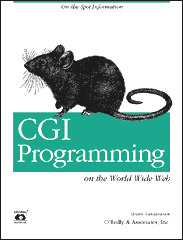
CGI Programming on the World Wide Web
By Shishir Gundavaram1st Edition March 1996
This book is out of print, but it has been made available online through the O'Reilly Open Books Project.
|
|
|

|
CGI Programming on the World Wide WebBy Shishir Gundavaram1st Edition March 1996 This book is out of print, but it has been made available online through the O'Reilly Open Books Project. |
C. CGI Modules for Perl 5
Contents:
Overview of Modules
Form Creation and Parsing
If you are tired of writing code to create forms, decoding form information, or maintaining state between multiple forms, you can make your life easier by using the freely available CGI modules for Perl 5. However, unless you are familiar with programming, it will be difficult to fully grasp how these modules work internally.
C.1 Overview of Modules
First, here is a list of the available modules. We will look at an example that incorporates the functionality from some of these modules shortly.
Base.pm
This is the core module that contains common methods (i.e., functions) that some of the other classes depend on. These include methods to read form information (the module does not parse or decode the data), log debug messages, implement socket I/O for maintaining state, and access and manipulate data from environment variables, such as the client's acceptable MIME content types.
If you are familiar with object-oriented programming, Base.pm represents the base class, from which other classes "inherit" methods and data structures. The "child" classes can override the methods from the base class to create modified functions, or implement new ones.
BasePlus.pm
This module consists of functions to handle the new multipart forms generated by "file upload"--a feature new to Netscape 2.0. The file upload feature allows users to send files on their local machines as part of a form. This is a very powerful feature, but decoding the data can be a hassle. So, you should use either this module or the CGI_Lite module to handle multipart forms.
Request.pm
You can parse and decode form and query data with this module. That's all there is to it!
Form.pm
Have you ever wished you could create forms much more quickly and easily than outputting a series of HTML tags? If so, the Form module is the one for you! You no longer have to remember how to create a radio button or a scrolled down list.
In addition, this module allows you to easily decode and parse form and query data. The functions responsible for this are inherited from the Base.pm and Request.pm modules.
MiniSvr.pm
With this module, you can implement a "mini HTTP daemon" which can be forked from a CGI application to maintain state between multiple form invocations. The daemon sits on a port with a relatively short timeout, waiting for a request. It then serves the request and terminates. Now, imagine what will happen to your host machine if the rate of process creation (i.e., forking) exceeds that of termination.
You need to be careful when using this module to maintain state, as it creates multiple processes to handle requests. If the rate of process creation exceeds that of termination, your server will become overloaded and may result in serious problems.
However, this module can be very helpful if used correctly, as all socket I/O is handled by the module so that you don't have to worry about such things as choosing the correct port number, establishing the socket, or reading from the socket.
Response.pm
Though not a part of the official CGI module distribution at the time of this writing, this module contains functions that make it easier to output HTML headers. For example, if you don't want a document to be cached, you can call a method that will automatically output the Pragma and Expires headers for you.
Carp.pm
This module is independent, in that it does not inherit any functionality from the base class. However, it is a very useful module that allows you to format error messages sent to the server log file or redirect them to the browser or another file.
Back to: CGI Programming on the World Wide Web
© 2001, O'Reilly & Associates, Inc.